Oh! Nuts ◊ Bulk Nuts & Seeds ◊ Bulk Peanuts
Bulk Peanuts
Browse our complete selection of Bulk Peanuts
 | |||
 | |||
 | |||
 | |||
 | |||
 | |||
 | |||
 | |||
Ultimate Guide to Nuts
PEANUTS
Who was George Washington Carver?
George Washington Carver (1864-1943) was an important pioneer in peanut research.
He developed over three hundred products from peanuts, peanut shells and
peanut foliage. These ranged from cheese and mayonnaise to shaving cream,
soaps, dyes, wallboard and plastics. In fact, peanuts have so many uses that
it is impossible to enumerate them all. Mr. Carver was able to serve an entire
dinner in which all of the food was made from peanuts, including soup, meat,
vegetables, milk, ice cream and coffee!
Mr. Carver was born a slave on a Missouri farm. He worked his way through school
and college, earning a master's degree in agriculture from Iowa Agricultural
College (later Iowa State), where he became the first black faculty member.
In 1896 he accepted Booker T. Washington's invitation to head the newly
formed Department of Agriculture, at an annual salary of $1,000. Carver taught,
wrote and worked in his Tuskegee laboratory for 47 years. He encouraged farmers to plant hardy peanuts instead of cotton, which
was depleting the soil of vital elements, and which was suffering badly from
damage by the boll weevil. Carver also did important experimental work with
sweet potatoes, pecans, soybeans and cow peas. This extraordinary man never
allowed any of his discoveries to be patented, for he wanted them to be freely
available for all.
During the 1930's Carver spent a lot of time treating various maladies
with a massage using peanut oil. Patients afflicted with poliomyelitis flocked
by the thousands to Tuskegee for the therapeutic peanut oil massage. Many of
them considered themselves to be helped by it, though Mr. Carver denied having
found a cure for polio.
Who else was instrumental in the development of peanuts as a crop?
Another important name in the history of peanuts in the United States was Amedeo
Obici (1876-1947). The Peanut King, as he was known, was born
in Italy, arriving in Brooklyn in 1888, at the age of twelve years. His first
job was as a bell boy in a hotel in Pennsylvania, at a salary of $1 a week.
Soon he moved from Scranton to Wilkes-Barre, where he peddled fruit and peanuts.
In a few years he opened up his own fruit stand, where he also sold salted,
roasted peanuts, an original creation of his. In those days peanuts were
usually bought in the shell, and if one wanted any seasoning he would add
it himself after removing the shell. Obici's peanuts were such a hit
that in 1906 he abandoned the fruit business and went into partnership with
his future brother-in-law, Mario Peruzzi. Together they rented a small factory
and installed two large peanut roasters. They liked the sound of the name Planters,
thus their new business was named Planters Nut and Chocolate Company?
The Planters Nut and Chocolate Company combined peanuts with chocolate and
syrups, which resulted in tastefully flavored confections. The company was
very successful, insisting always on good quality, brand name, creation of
consumer demand and repeat business. By 1910 salted peanuts and packaged peanut
confections were sold in glassine, see-through bags.
Two years later, Obici decided the time had come to establish his own processing
plant for raw peanuts. He chose Suffolk, Virginia, due to its proximity to
the peanut fields, and opened a Planters factory there in 1913; by 1927 Planters
had become an industrial giant, which would eventually own 36 buildings in
Suffolk, and factories in San Francisco and Toronto.
In 1916 Obici sponsored a contest and offered a prize for the best peanut symbol.
The winning drawing was submitted by a fourteen-year old schoolboy. It was
a picture of a humanized peanut, and became the famous Mr. Peanut symbol
after a commercial artist added a cane, hat and monocle. Soon the familiar
Planters displays featuring Mr. Peanut were seen all over the
country in highly successful national advertisements.
In 1930 Obici began vigorously promoting peanut oil as an edible alternative
to more expensive oil that was currently in use. His timing could not have
been better. During the Great Depression he introduced a highly popular Nickel
Lunch, featuring peanuts. Cellophane replaced glassine in 1932 as the
primary material for the 5¢ peanut packages. Automatic machinery was installed
a few years later at Suffolk, to be used for forming, filling and packaging
all peanut products.
Amedeo Obici retained his position at the head of the Planters Peanut Company
until his death in 1947. He was succeeded by his friend and partner, Mario
Peruzzi. By then, Planters had become the largest and most diversified peanut
processing corporation in the world. In 1960 the Planters Company became part
of Standard Brands, Inc., which is now known as Nabisco Brands, Inc.
Where did peanuts come from, and how did they spread around the world?
Peanuts are indigenous to South America, having probably originated in Bolivia
at the base of the eastern slopes of the Andes. In fact, the peanut is one
of the ten plants of major economic importance which the Americas have contributed
to the world's agriculture; the other nine are corn, white
potato, sweet potato, rubber, common bean, tobacco, cassava and cacao.
The peanut is strictly-speaking a legume, not a nut. But due to its nut-like
characteristics it is considered a nut in popular usage, albeit not according
to botanical considerations. The cultivated peanut is the hard, ripe, nut-like
seed or bean of Arachis hypogaea Leguminosae. Some 40-70 other species of Arachis
occur in Brazil, Paraguay, Argentina and Uruguay, as well as in Bolivia. A
wild, perennial species of Arachis has become an important ground cover in
several towns and cities of Amazonia, such as Leticia in Colombia and Manaus
in Brazil, where this prostrate plant forms green lawns that do not require
mowing.

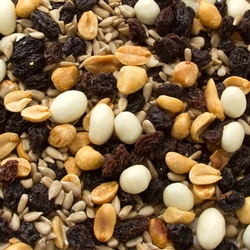

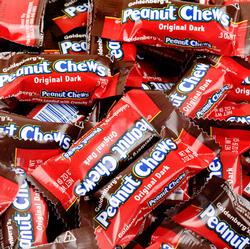

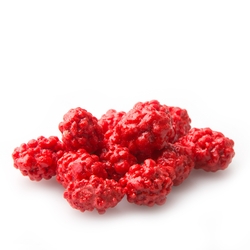


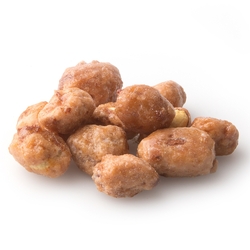


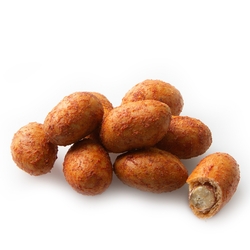
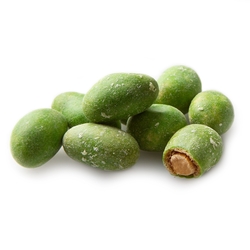
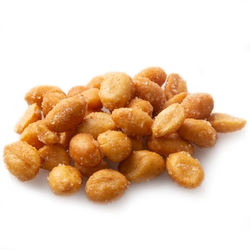
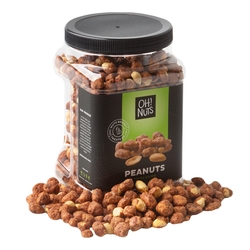
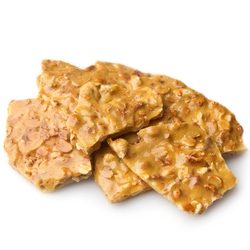
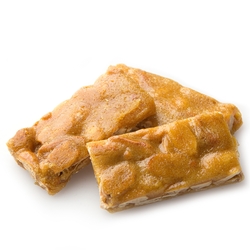
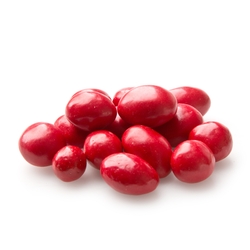
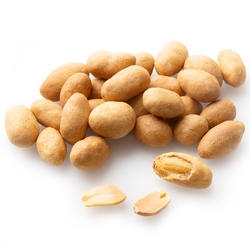
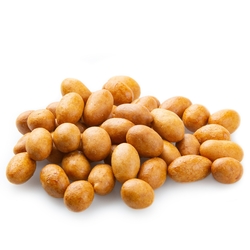
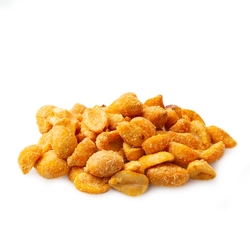
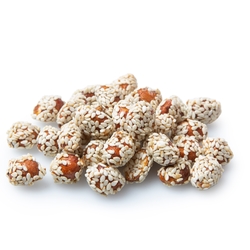
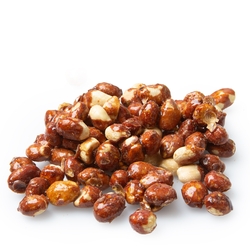
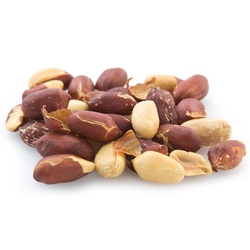
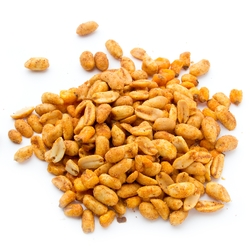
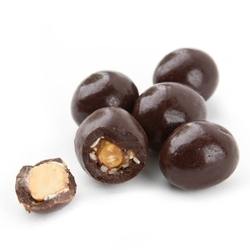
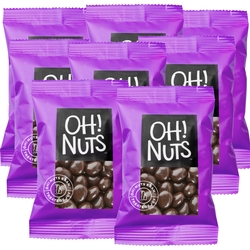
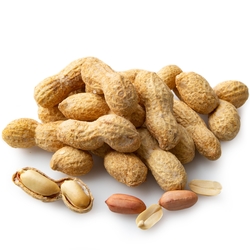
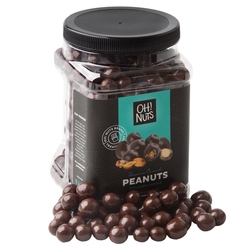
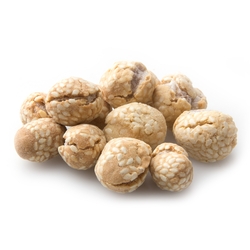
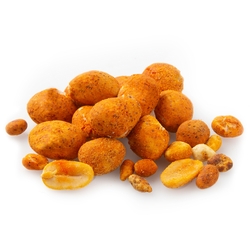
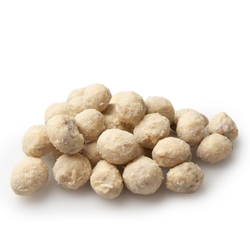
 or
or 
